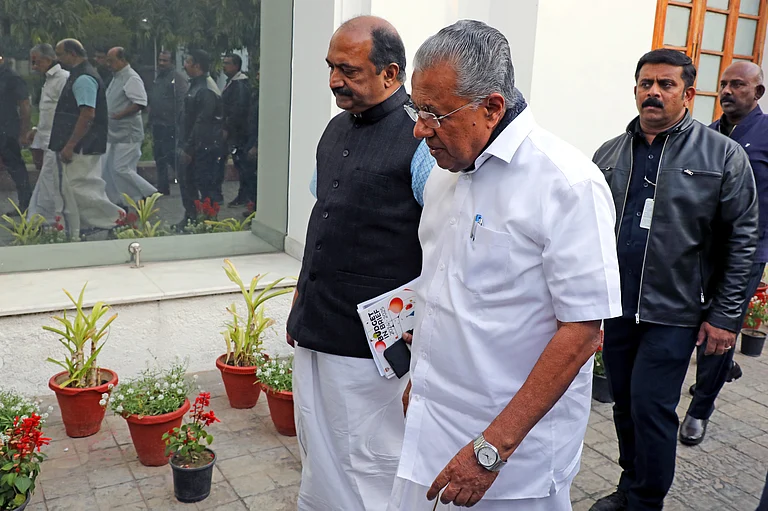How long will Kerala continue to be a remittance economy? The Kerala Migration Survey 2023 suggests that it would not be so long. The survey finds that the migration for labour reaches a saturation point, but the migration for education shows a rising trend. However, the State remains to be the highest in terms of foreign remittance holding a steady 21 per cent share of India’s NRI deposits, a figure that has remained consistent since 2019.
According to the Kerala Migration Survey conducted by the Gulati Institute of Finance Taxation (GIFT) and the International Institute of Migration and Development (IIMAD), the number of emigrants from Kerala is estimated to be 2.2 million. Two out of five households in Kerala were found to have non-resident Keralites, indicating the significant presence of migration experiences within the economy and society.
Having a sample size of 20,000 house-holds across 500 localities in 14 Districts, KMS 2023 is one of the largest socio-economic surveys conducted in Kerala since the state’s formation in 1956. The Kerala Migration Survey of 2023 indicates the early signs of saturation as the total number of emigrants remain steady since 2018 Survey. "This stability in international migration over the last five years is interesting, given the overall declining trend observed over the past decade in the previous rounds of KMS. Although there is a slight increase of 32,388 emigrants in 2023, 9 out of the 14 districts in Kerala observed a considerable decline in the number of emigrants when compared to 2018, indicating a saturation of international migration,” states the survey report.
Student migration on the rise
The Survey suggests that from 1,29,763 student emigrants in 2018, the number has doubled to about 2,50,000 in 2023. "This notable increase in student emigration underscores a significant shift in the demographics of emigrants from Kerala, wherein there has been an increase in the number of emigrants leaving at a very young age, as early as 17 years. The KMS 2023 has revealed that students constitute 11.3 per cent of total emigrants from Kerala, indicating that a growing number of younger individuals are choosing to emigrate, particularly for educational opportunities abroad."
The rise in student migration is reflected in the changing patterns of the destination countries as well. Though GCC (Gulf Cooperation Council) Countries remains to be the most sought after destination for employment migration, there is a tangible shift of destination countries as USA, Europe and Canada indicating the rising trend of student migration. The number of emigrants choosing GCC countries declined from 89.2 per cent in 2018 to 80.5 per cent in 2023. Simultaneously there has been a rise in the number of emigrants preferring non-GCC destination countries, from 10.8 per cent in 2018 to 19.5 per cent in 2023 which is a clear signal of the demographic shift in the migration pattern. Besides, for the first time, the migration survey finds another interesting shift in the nature of remittance. The outward remittance from Kerala has considerably increased indicating the rising trend of student migration to foreign Universities. The survey finds that the State accounted an outward remittance of Rs 43,378 crores which is about 20 per cent of the inward remittance in 2023.
‘Women migrate; do not want to come back’
The survey also indicates that women who migrate do not prefer to come back. This trend is observed mostly among the girls who migrate to other States in India for educational purpose. The migration to other States within the country is called out migration. The majority of migrants going for employment to other States are men constituting 64 per cent . However, the student Out-Migration shows a reverse trend as 57.8 being girls. According to the survey, 75 per cent of the return out migrants (those who return back to Kerala) are men, but the rate of return out student migration among the girls is marked as 35.8 per cent. “This is an indicator of our higher education scenario and the situation of the women in the State. The Higher education sector is occupied by women and they prefer to settle down in the destination States. We have to do further studies to find the reasons for this phenomena," says Dr S Irudaya Rajan, Chairman of the International Institute of Migration and Development.
However, most of the migrant women in GCC Countries have migrated along with their husbands. Hence the pattern of their return migration does not show a trend different from that of men, says Dr Irudaya Rajan. The number of emigrants who have returned from destination countries is estimated to be 1.8 million according to the 2023 Survey which shows a significant increase from 1.2 million found in the 2018 Survey. The survey reports suggests that this increase over the last few years had been expected due to the global health crisis-induced economic disruptions, stricter immigration policies, and a significant reduction in available job opportunities. Many migrants found themselves in an untenable position, unable to find new employment while also facing mounting pressures. A substantial number of them were thus compelled to return to their home countries, driven by the loss of jobs, compulsory resignations, and other pandemic-related challenges. The major reason for return was found to be job losses/layoffs, as reported by 18.4 per cent of return migrants.
Foreign remittance: Kerala remains to be the richest
According to KMS 2023, the total remittances to Kerala saw a significant surge after the pandemic. Total remittances reached Rs 216,893 crores in 2023 from Rs 85,092 crores in 2018, marking a 154.9 per cent increase. The total remittances of Rs 216,893 crores imply a remittance of Rs 61,118 per capita for a population of 3,549 crores. A similar trend of increased remittances to households is also captured by KMS 2023, wherein the remittances sent by the emigrants to Kerala households amounted to Rs 37,058 crores, reflecting a 20.6 per cent increase from the 2018 figures.
According to Kerala Migration Survey, Kerala holds a steady 21 per cent share of India’s NRI deposits, a figure that has remained consistent since 2019. The foreign remittances constituted 1.7 times the revenue receipt of the state. The share of remittances, as a per cent of Net State Domestic Product (NSDP), has seen an increase to 23.2 per cent in 2023 from 13.5 per cent in 2018.




























